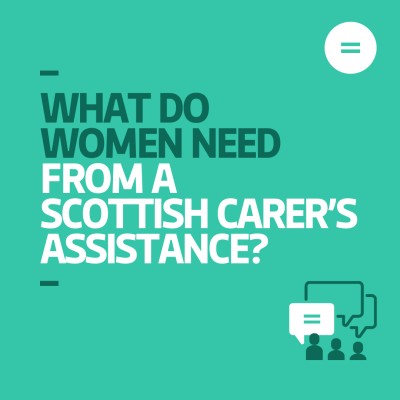Engender blog
8 Steps Towards Women’s Equality in Scotland
Ahead of the next Programme for Government for 2024-25, we have outlined several important actions we want the Scottish Government to take to protect women’s rights and promote gender equality in Scotland.

Engender advocates for a Scotland where women are involved in all political and economic decisions, both as decision-makers and individuals affected by these decisions. This means recognising the diverse experiences of all women, including those facing multiple forms of discrimination, such as Black and minority ethnic women, younger and older women, disabled women, lesbian, bisexual, and trans women, women from rural areas, and those who are mothers, women who have experienced domestic abuse or men’s violence, and those experiencing poverty.
We have identified eight key actions in three main areas that need change:
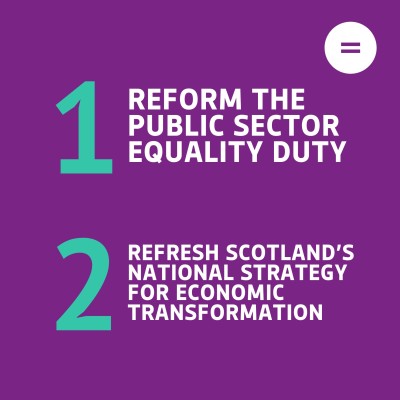 EMBED GENDER EQUALITY ACROSS ALL SCOTTISH GOVERNMENT POLICY
EMBED GENDER EQUALITY ACROSS ALL SCOTTISH GOVERNMENT POLICY
To achieve the Scottish Government’s main goals—eliminating child poverty, boosting the economy, addressing climate change, and improving public services—it’s crucial to improve how gender equality is considered across policymaking. These goals affect women and men differently, especially for women facing additional marginalisation. If policies don’t account for structural inequalities, their benefits for Scotland’s most disadvantaged people will be limited.
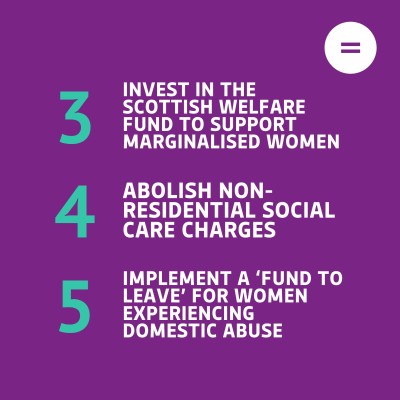 ADDRESS WOMEN’S POVERTY AND FINANCIAL INEQUALITY
ADDRESS WOMEN’S POVERTY AND FINANCIAL INEQUALITY
Eliminating child poverty is the First Minister’s top priority. To succeed, the Programme for Government must connect women’s poverty with children’s poverty. There’s an urgent need to get financial support to the most vulnerable families in Scotland, and focusing on women’s economic inequality is often the most effective approach. This must include targeted actions which tackle the disproportionately negative impacts that the cost of living crisis is having on women’s lives, especially for women who experience other forms of marginalisation.
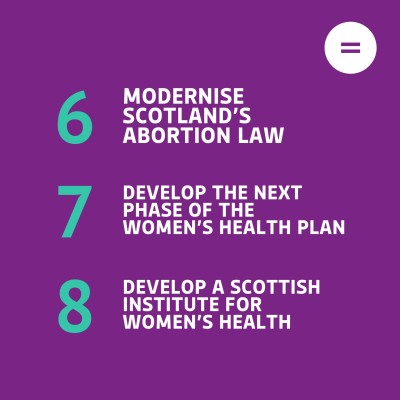 TACKLE WOMEN’S HEALTH INEQUALITIES AND PROTECT REPRODUCTIVE RIGHTS
TACKLE WOMEN’S HEALTH INEQUALITIES AND PROTECT REPRODUCTIVE RIGHTS
Women and girls still face inequalities in health and wellbeing and access to services compared to men and boys, mainly due to gender inequality and “medical misogyny.” Marginalised women, including women of colour, disabled women, unpaid carers, LGBTI+ women, younger and older women, and migrant women, experience even wider disparities in health outcomes. We urgently need updated abortion laws that uphold women’s rights and action to advance Scotland’s Women’s Health Plan.
Read more about all our asks here.
Why the proposed Scottish Carer's Assistance must do more to value unpaid care
This week marks Carers Week, and it comes after two years which have shown, more clearly than ever, the vital role that unpaid carers play. The Covid-19 pandemic highlighted what half of the population already knew – that women take on the vast majority of unpaid care work, and that without them our society and economy could not function.
The Scottish Government has been consulting on their proposals to replace Carer's Allowance with a Scottish Carer's Assistance, as part of the devolution of some social security payments to Scotland. The provision of unpaid care, and its interactions with social care, are closely interlinked with systemic and harmful gender roles that constrain women’s lives, with women’s access to paid work, leisure time and power remaining heavily constrained by the provision of care and gendered expectations around its value and delivery.
What do women need from a Scottish Carer’s Assistance?
In this post, we're sharing Engender's guide to filling out the Scottish Government's consultation on Carer's Assistance. You can also access this information as a PDF document here.
The Scottish Government is consulting with people in Scotland about a Scottish Carer’s Assistance, which will replace Carer’s Allowance in Scotland.
Care is a key issue of women’s equality:
- Between 60% and 70% of unpaid carers are women.
- Women are the majority of carers providing over 35 hours of care per week.
- Women are 2x as likely to give up paid work to provide care, rising to 4 x more likely for ‘sandwich care’.
Engender have produced this guide to help carers respond to this consultation. You can find out about the Scottish Government’s plans for Carer’s Assistance by watching this video from the events Engender held with carers here, or taking a look at the detailed proposals here.
How to respond to the consultation
The consultation can be filled out online here by May 23rd.
The consultation asks a number of questions about specific elements of the Scottish Government’s proposals around Scottish Carer’s Assistance, and also some more general questions. There is no need to answer every question.
- Question 1 asks about how Scottish Carer’s Assistance should be designed to suit your needs.
- Question 2 asks about how Scottish Carer’s Assistance should link with other support (for example other social security payments).
- Questions 3-42 ask about specific aspects of a carer’s assistance, whether you agree or disagree with the proposals, and why/why not.
- Question 43 gives you space to share any other thoughts you have about the Scottish Carer’s Assistance.
- Questions 44-48 ask about how the Scottish Carer’s Assistance might impact differently on different groups of people.
What should you say?
It’s really important that as many people as possible with experience of providing care respond to the consultation, and that the Scottish Government recognise that care is an issue of women’s equality. Here are some things, in the bullet points below, to keep in mind when you answer the consultation. Keep in mind that you don’t have to share anything you are not comfortable with.
In the ‘About Me’ section of the consultation, you can choose whether your response is published with a name, without a name, or not published at all. If you select ‘Do Not Publish Response’ it will be treated confidentially. They will still take account of your views for their analysis but will not publish your response, quote anything that you have said or list your name.
- It’s helpful if you can share information about your circumstances to ‘tell the story’ of you as a carer – it can help people understand what unpaid care looks and feels like.
- Think about questions like: When did you start caring? Who do you care for? Why did you start caring?
- If you currently receive Carer’s Allowance, what are the good and bad things about it? You might want to think about things like how much you receive, how flexible it is, whether it is easy to access.
- How does caring impact on your life – on your ability to access paid work, on your financial circumstances, on your opportunities for fun?
- Are there any issues that you experience as carer that you feel women experience differently from men? Do you think that caring interacts with other areas of inequality.
Exploring the impact of Covid-19 on women's equality in Scotland
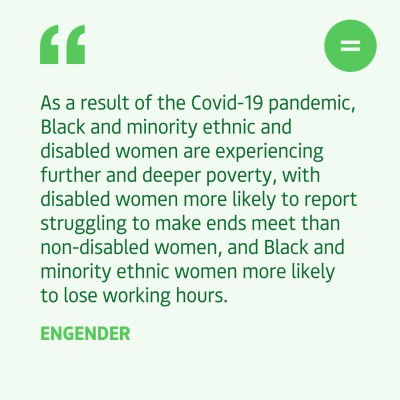
Over the past eighteen months, we’ve seen how the inequalities that existed before Covid-19 have been magnified and intensified by the pandemic. Covid-19 has disproportionately impacted women both at work and at home, with UN Women estimating that the impact for women’s equality could mean a rollback of 25 years of progress on women’s rights.
Women in Scotland face a reduction in paid work both due to increased caring responsibilities and being concentrated in industries hardest hit by the pandemic like hospitality and nursing, which also places women at increased risk of exposure to Covid-19. There is a widening gender gap in unpaid work as women are expected to pick up the slack created by widespread reduction in social care packages, made even more difficult by the persistent inadequacy of social security provision, which has been further compounded by the recent £20 cut in Universal Credit.
Throughout the past year, we’ve joined with organisations across the 4 nations of the UK including Close the Gap, the UK Women’s Budget Group, the Fawcett Society, Women’s Equality Network Wales and the Northern Ireland Women’s Budget Group in a polling project to collect survey data on the impact of Covid-19 on women, funded by the Standard Life Foundation and the Joseph Rowntree Reform Trust. We’ve also worked with Close the Gap to produce joint reports highlighting what this data tells us about the impact of Covid-19 on women in Scotland specifically.
Where are the women in Scottish Government plans for a National Care Service?
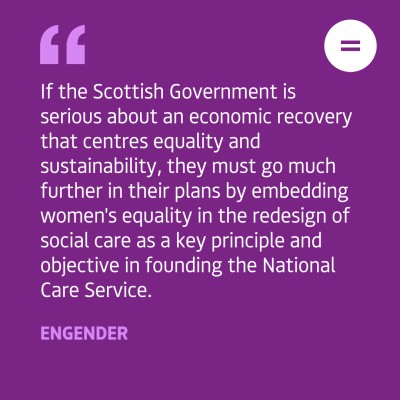
Care is one of the key areas of women’s inequality in Scotland, with women representing the majority of service users, the vast majority of the social care workforce, and the majority of unpaid carers. Care continues to be undervalued and underpaid, precisely because of its long association with ‘women’s work’ and outdated gender norms.
Yet the Scottish Government’s Consultation on a proposed National Care Service for Scotland seems to completely ignore this fact, failing completely to consider gender in their proposals. Equality is not embedded in their plans, and the consultation document does not take into account women’s lives and experiences. The Government has not even published an equality impact assessment as part of the consultation, which would have highlighted the disproportionate impact that failures in social care have on women. In order to be effective, impact assessments should be done as early as possible to actually inform the development of policy.
Downloads
 Engender Briefing: Pension Credit Entitlement Changes
From 15 May 2019, new changes will be introduced which will require couples where one partner has reached state pension age and one has not (‘mixed age couples’) to claim universal credit (UC) instead of Pension Credit.
Engender Briefing: Pension Credit Entitlement Changes
From 15 May 2019, new changes will be introduced which will require couples where one partner has reached state pension age and one has not (‘mixed age couples’) to claim universal credit (UC) instead of Pension Credit.
 Engender Parliamentary Briefing: Condemnation of Misogyny, Racism, Harassment and Sexism
Engender welcomes this Scottish Parliament Debate on Condemnation of Misogyny, Racism, Harassment and Sexism and the opportunity to raise awareness of the ways in which women in Scotland’s inequality contributes to gender-based violence.
Engender Parliamentary Briefing: Condemnation of Misogyny, Racism, Harassment and Sexism
Engender welcomes this Scottish Parliament Debate on Condemnation of Misogyny, Racism, Harassment and Sexism and the opportunity to raise awareness of the ways in which women in Scotland’s inequality contributes to gender-based violence.
 Gender Matters in Social Security: Individual Payments of Universal Credit
A paper calling on the Scottish Government to automatically split payments of Universal Credit between couples, once this power is devolved to the Scottish Parliament.
Gender Matters in Social Security: Individual Payments of Universal Credit
A paper calling on the Scottish Government to automatically split payments of Universal Credit between couples, once this power is devolved to the Scottish Parliament.
 Gender Matters Manifesto: Twenty for 2016
This manifesto sets out measures that, with political will, can be taken over the next parliamentary term in pursuit of these goals.
Gender Matters Manifesto: Twenty for 2016
This manifesto sets out measures that, with political will, can be taken over the next parliamentary term in pursuit of these goals.
 Scottish NGO Briefing for UN Special Rapporteur on Violence Against Women
Joint briefing paper for the UN Rapporteur on Violence Against Women.
Scottish NGO Briefing for UN Special Rapporteur on Violence Against Women
Joint briefing paper for the UN Rapporteur on Violence Against Women.

Newsletter
Sign up to receive our newsletter here:
Sign up to our mailing list
Receive key feminist updates direct to your inbox:
